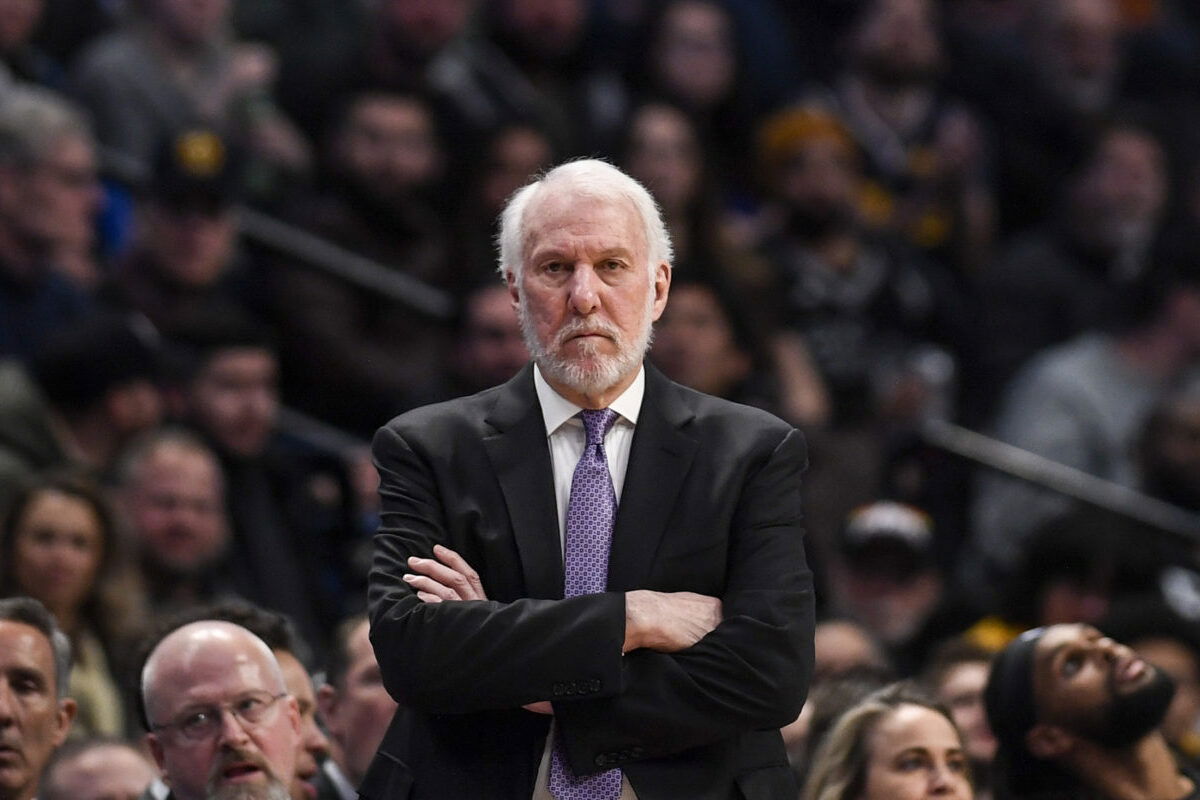
Getty
DENVER, CO – FEBRUARY 10: Gregg Popovich of the San Antonio Spurs watches the action agains the Denver Nuggets during the third quarter on Monday, February 10, 2020. (Photo by AAron Ontiveroz/MediaNews Group/The Denver Post via Getty Images)

Getty
DENVER, CO – FEBRUARY 10: Gregg Popovich of the San Antonio Spurs watches the action agains the Denver Nuggets during the third quarter on Monday, February 10, 2020. (Photo by AAron Ontiveroz/MediaNews Group/The Denver Post via Getty Images)
For nearly three decades, Gregg Popovich coached the San Antonio Spurs with a touch of trust, discipline, and excellence. Now, as he steps away, the game feels a little quieter, a little heavier. How do you find the words to part with the voice that defined an era, the steady hand that turned a franchise into a family? More than anything, what makes him evergreen is how he shaped some of the NBA’s most admired careers. He turned potential into legacy, molding Tim Duncan into the steady force behind five titles. Transforming Tony Parker from a raw teen into a Finals MVP. Kawhi Leonard arrived as a defensive specialist and, under Pop’s guidance, blossomed into an all-around force. Disciples like Steve Kerr, Becky Hammon, and Ime Udoka now spread his philosophy from their benches. The way they talk about him says it all.
Watch What’s Trending Now!
On May 2, 2025, after 29 seasons, five titles, and over 1,400 victories, the beloved Pop officially retired as head coach of the San Antonio Spurs. Though expected, the moment still carried the weight of history. He’ll stay on as President of Basketball Operations, but the game won’t be the same without his intensity, deadpan sideline interviews, or postgame musings on everything from wine to world affairs. For the players he shaped, his departure means losing a guiding force. One such Vet, who has been a part of multiple benches throughout his career, had something special to credit to Pop.
ADVERTISEMENT
In an interview with ESPN, Richard Jefferson said, “Greg Popovich helped transition my career individually and say, Richard, we need you to become more of a percentage three point shooter. I shot 40 percent for the first time in my career with the San Antonio Spurs, and that’s what extended my career. That’s what allowed me to be a more effective player up until year 17 when I retired.” He revealed how Gregg Popovich reshaped his career and his mindset. “If it wasn’t for him and Chip England having that impact, saying, Richard, this is the next portion of your career. So I am forever grateful for him, for his teaching, for his ability to just put you in a position to be successful within the system that they were working in.” He said, emphasizing how Popovich and assistant Chip Engelland redefined his role to be more fitting.
View this post on Instagram
ADVERTISEMENT
But Pop’s influence ran deeper than mechanics. During tense playoff film sessions, he’d reframe pressure by reminding players to be grateful. “That’s what was so impressive about him, his approach to the game. He would get in there and we would have film sessions and he was like, yeah, we’re down 1-0. That’s not a problem. (so) what’s a problem? A problem is these individuals that are fighting for their food. These individuals that are living in war-torn countries, he had an ability to, even when you were under a tremendous amount of stress and pressure, you still felt blessed to be in the position of what you were doing.” Richard Jefferson’s career renaissance under Popovich proved the coach’s gift for unlocking hidden potential in players. But Pop’s true mastery lay in teaching men to see beyond basketball while still demanding their best within it.
ADVERTISEMENT
Gregg Popovich: Beyond Basketball
Gregg Popovich’s legacy extends far beyond his NBA championships and record-breaking wins. A man of deep conviction, he has consistently used his platform to advocate for social justice, becoming one of sports’ most respected voices on equality, human rights, and political accountability. Whether addressing racial injustice in postgame interviews or participating in Jay-Z’s Social Justice Summit, Popovich never shied away from difficult conversations.
ADVERTISEMENT

His famous words, “Obviously, race is the elephant in the room and we all understand that. Unless it is talked about constantly, it’s not going to get better,” reflect his unwavering commitment to progress. Off the court, Popovich’s philanthropic efforts have made a tangible difference. He has been a longtime supporter of the San Antonio Food Bank, helping combat food insecurity in his community. He believed “We’ve got a problem in the city that should anger, frustrate, and embarrass all of us. You don’t want to see kids going to bed hungry, and older people not being able to get food.”
ADVERTISEMENT
His contributions often came without fanfare. Anonymous donations, quiet acts of service, and hands-on involvement in local education initiatives. For Popovich, giving back wasn’t performative; it was a moral obligation rooted in his military background and belief in collective responsibility. Though he’s stepped away from coaching, Popovich’s impact endures. His legacy isn’t just in trophies, but in the lives he changed and the standards he set. He proved that true greatness is measured by more than wins.
ADVERTISEMENT
ADVERTISEMENT
ADVERTISEMENT